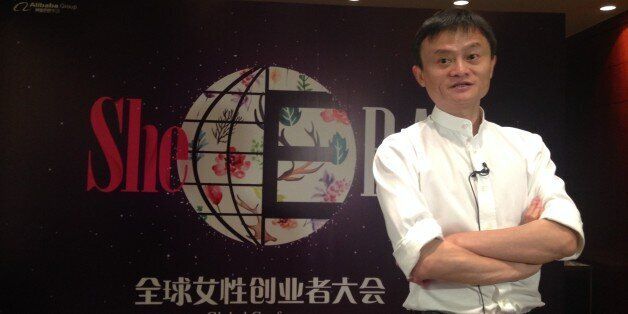HANGZHOU, China — While Silicon Valley grapples with a major gender gap in its workforce, Jack Ma, the founder of Chinese e-commerce juggernaut Alibaba, said Wednesday that women are the “secret sauce” behind his company’s success.
The proclamation came during Alibaba’s first-ever Global Conference on Women and Entrepreneurship. The two-day event in Hangzhou, China, included speeches from women as varied as Queen Máxima of the Netherlands, actress and entrepreneur Jessica Alba and Arianna Huffington, The Huffington Post’s founder and editor-in-chief.
Since starting Alibaba out of his apartment in 1999, both Ma and his company have grown to be giants in China’s tech landscape. The business now stands as the country’s biggest online marketplace, and has garnered Ma a net worth of over $24 billion. Alibaba is so prominent that over 60 percent of packages delivered in China are from its orders, according to a 2014 New York Times article.
The company was using the event this week to promote women’s entrepreneurship, as well as its own relatively strong record on gender equality. According to Alibaba, over 40 percent of all its employees are women. Women make up nearly 35 percent of the company’s high-level managers and one-third of its founders.
While those numbers fall short of total gender parity, they still stand out when compared with most Silicon Valley firms.
Several of Alibaba’s high-level female employees spoke at the event, including Zhang Wei, Alibaba Group senior vice president, and Lucy Peng, Alibaba Group chief people officer and CEO of a financial services subsidiary. Zhang acted as host throughout the day on Wednesday, while Peng gave a speech on how she evolved at the company and learned to overrule male colleagues.
Ma spoke at the end of the event, and fielded questions from both fans and reporters. He said women approach communication and problem-solving in a way that’s particularly important for a service and retail company like Alibaba.
“Men think about themselves more; women think about others more,” Ma said. “Women think about taking care of their parents, their children.”
That essentialist language might raise some eyebrows in feminist circles, as would distinctions that Ma occasionally laid out between men who operate according to logic and women who act more on intuition. But Ma frequently invoked ancient Chinese philosophy, particularly Taoist concepts of yin and yang, in describing his vision of the strengths that women have brought to Alibaba.
“I feel proud that more than 34 percent of senior management are women. They really make this company’s yin and yang balanced,” Ma said. “Women balance the logic and the instinct. I would say this is the ‘secret sauce’ of the company.”
Asked about the gender gap in Silicon Valley companies, Ma said that while he doesn’t know the numbers, he believes that the most successful companies likely make gender parity a priority.
At least one 2014 report by Fenwick and West appears to bear out Ma’s prediction. The report shows that while Silicon Valley lags far behind in gender equality, the top 15 tech firms do significantly better than the top 100 when it comes to including women in the highest leadership posts.




